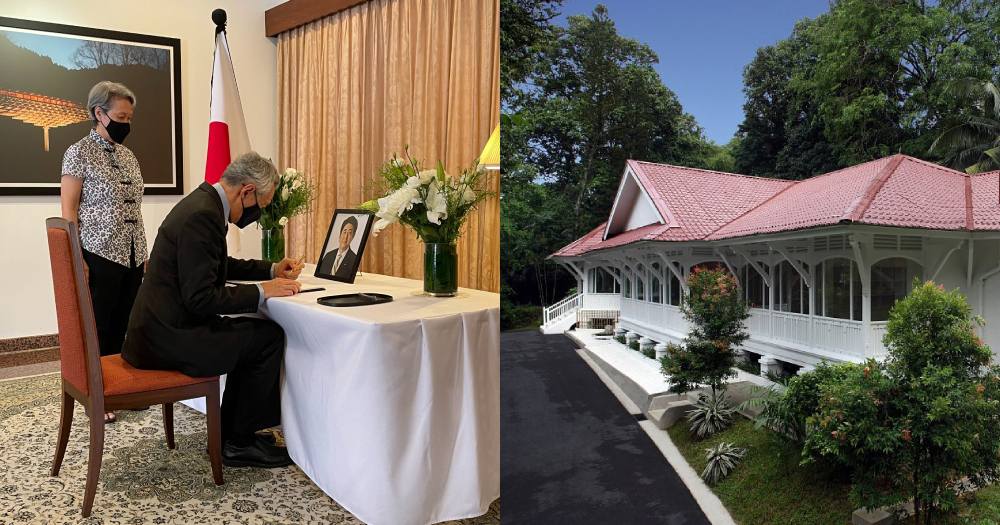Follow us on Telegram for the latest updates: https://t.me/mothershipsg
The Embassy of Japan in Singapore held a book of condolence signing for the former Japanese Prime Minister Shinzo Abe at the Japan Creative Centre on July 12 and 13.
"A leader who worked hard for Japan"
When Mothership visited at around 10.15am on July 13, a small queue was present inside the building, with several mourners waiting to sign the condolence book. We spent a half hour outside the premises talking to three mourners who had come to sign the book and pay their respects, and counted about 15 people in a steady stream arriving, most dressed in sombre colours and some carrying bouquets of flowers.
A Japanese woman, who had come with two friends, carried a bouquet of white flowers. All three were dressed in black. She said that she was "very shocked" at Abe’s assassination, and that she wanted to convey her appreciation for a leader who she felt had "worked hard for Japan".
One Singaporean man, also dressed in black, said that he was there to pay respects on behalf of himself and his Japanese wife, who was unable to sign the book in person.
He felt that his attendance was the least he could do to show respect for Abe, who he noted had also rushed down to Singapore for the funerals of Lee Kuan Yew and SR Nathan.
Finally, a pair of Singaporean men shared that they wanted to show their condolences. They said that it was especially “tragic for an honourable individual like Abe to go in such a way”. They also said it was a “bad showing for the times we are living in.”
When asked about Abe’s achievements, they cited his attempts to bring more women into the Japanese economy, as well as his contributions to building stability to the region, as well as his efforts in advocating for a free and open Indo-Pacific.
Singaporean Prime Minister Lee Hsien Loong, and his wife Ho Ching, also signed the book on the morning of July 12. The Japanese embassy said it hoped to “further deepen our bilateral ties by drawing on Prime Minister’s Abe’s legacy".
Private funeral, with mourners lining the streets
Abe had been assassinated on July 9 by a man wielding a homemade gun. The man’s motive appears to have been a personal grievance with the Unification Church, with whom he associated Abe with.
Abe’s funeral was held in Tokyo on July 12, with several thousand people lining the streets to pay final respects for the longest serving Japanese prime minister in the post-war period.
Friday: Shinzo Abe was fatally shot in Nara
— Kurumi Mori (@rumireports) July 12, 2022
Saturday: His body was returned to his residence in Shibuya, Tokyo
Monday: His casket arrived at Zojoji Temple and the wake began
Tuesday: Funeral service attended by members of Abe's family and close contacts pic.twitter.com/3RjmbdWMsC
Despite the crowds, the funeral was a private affair for family and friends. There have been some discussions held about holding a more formal state funeral for Abe later in the year, according to The Japan Times.
Traditionally the passing of former Japanese prime ministers are marked by their political party, but it is thought that due to special circumstances surrounding his achievements and the manner of his assassination, an exception might be made.
In any case, a more public event will likely involve foreign dignitaries, and Japan’s foreign ministry is beginning to make preparations for such an occasion.
Top image by Embassy of Japan in Singapore & Japan Creative Centre via Facebook
If you like what you read, follow us on Facebook, Instagram, Twitter and Telegram to get the latest updates.
